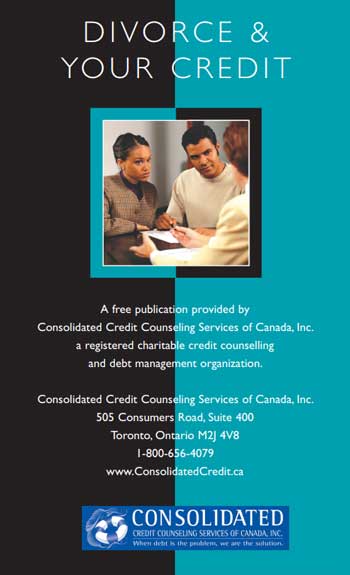
Divorce and Your Credit
Frequently, one spouse is responsible for maintaining a couple’s bank accounts and paying bills, while the other spouse may be in the dark. Make yourself aware of what’s going on as soon as you can. It’s no surprise that the spouse that knows the least about joint assets is at the greatest risk financially.

Congratulations on taking this important step to a brighter financial future. Consolidated Credit Canada has been helping Canadians across the country solve their credit and debt problems for years.
Our Educational Team has created over twenty-five publications to help you improve your personal finances. By logging onto www.consolidatedcreditcanada.ca you can access all of our publications free of charge. We have tools to help you become debt-free, use your money wisely, plan for the future, and build wealth. The topics Consolidated Credit Canada addresses range from identity theft to building a better credit rating; from how to buy a home to paying for university. On our website, you will also find interactive tools that allow you to calculate your debt and see how much it is costing you.
We are dedicated to personal financial literacy and providing a debt-free life for Canadians. If you are overburdened by high-interest rate credit card debt, then I invite you to speak with one of our trained counsellors free of charge by calling (844)-402-3073 for free professional advice.
Sincerely,
Jeffrey Schwartz
Executive Director
Consolidated Credit Canada.
Divorce & Credit
Preparing Yourself for Divorce
Thinking about divorce? Then it’s time to get your financial house in order. It’s easy to protect yourself and your credit if you know how. Your first step? Open chequing and savings accounts in your own name and don’t tell your spouse. Frequently, when couples are contemplating divorce, one spouse will write bad cheques or somehow abuse the joint bank account, leading to credit problems for the innocent spouse. Opening your own accounts and keeping them quiet-you can help avoid credit problems in the future.
Open your individual accounts quickly, and fund them with as much money as you can stash away. To avoid major change, pay close attention to your credit rating, and make sure you don’t get in over your head in credit card and other unsecured debts.
Frequently, one spouse is responsible for maintaining a couple’s bank accounts and paying bills, while the other spouse may be in the dark. Make yourself aware of what’s going on as soon as you can. It’s no surprise that the spouse that knows the least about joint assets is at the greatest risk financially.
To avoid being taken advantage of, try to collect as much information as you can before divorce is even discussed. Make copies of bank account records, credit card statements and tax returns. In particular, make sure you have balances, transaction statements, contact names, addresses and phone numbers for the following:
• Joint bank accounts
• Credit cards
• Brokerage statements
• Tax returns
• Business interests
• Pension funds
• RRSP’s
• Loans
• Medical coverage
• Insurance (home, auto, life)
• Wills and trusts
• Marital assets (artwork, antiques)
• Mortgage
• Indebtedness
• Inheritances
• Safe deposit boxes
To protect yourself, store copies of relevant documents in a safe place-a secret safe deposit box, at a friend’s house, or at your lawyer’s office. For additional privacy, consider opening a post office box or having personal mail directed to a friend’s address.
What You Should Know If You Are Going Through a Divorce
If you are considering a divorce, going through a divorce, or are newly divorced or legally separated, you must pay careful attention to your credit. Why?
Let’s say that pursuant to your divorce decree, your spouse is required to pay off two jointly held credit cards. A few months later, he or she neglects to make payments as required, and your creditors contact you demanding payment. You advise them that according to your divorce decree, your ex is responsible for the debt. Not so, your creditors reply. Since they were not parties to the decree, you are still legally responsible for paying off the joint accounts. Although you can proceed against your ex for violating the decree, your creditors still have the right to report any and all the late payments to the credit bureau. Those negative marks are now part of your credit history.
If you have joint credit accounts while you are separated or in the middle of divorce proceedings, ensure that regular payments are being made. That way, your credit record won’t suffer. It’s important to remember that as long as there is an outstanding balance on any joint account, both you and your spouse are liable for it.
You should also ask creditors to close any joint accounts or accounts on which your ex was an authorized user. As an alternative, you can request that the creditor convert the joint account to an individual one and have the debt transferred to the spouse who is responsible for paying it.
By law, creditors cannot automatically close a joint account due to a change in marital status, but they can do so at the request of either spouse. Creditors don’t have to agree, however, to convert joint accounts to individual ones. Instead, a creditor can require you to reapply for credit on an individual basis and then decide based on your new application to either extend or deny you credit. Similarly, when a divorcing couple has a mortgage or home equity loan, the lender will probably require you to refinance the loan to remove one spouse from the obligation.
Individual and Joint Accounts
There are two different types of credit accounts, individual and joint. When you apply for credit-whether it’s a credit card, bank loan, or mortgage-you’ll be asked if you want to open an individual or joint account. (Even if you establish an individual account, however, you can authorize another person to use it.).
When you apply for an individual account, the lender will consider only your income, assets, and credit history. If you are approved for an individual account, you and only you are responsible for paying off the debt even if you are married. The account will appear on your credit report and may appear on the credit report of any authorized user.
For spouses who earn little or no income, it may be difficult to obtain credit or be approved for a loan without the other spouse co-signing the application. If you are able to open an account, however, make sure you establish a strong credit history by making all payments on time.
When you apply for a joint account, the lender will consider the income, assets, and credit history of both spouses.
Even if only one spouse handles the money and pays the bills, both spouses are responsible for ensuring that a joint debt gets paid. Any lender who reports on the credit history of an account held jointly must report it in both names.
A joint credit application combines the financial resources of two or more people and may make a potential creditor feel more secure and therefore more likely to approve the loan or credit card. Be aware, however, that each person who applied for the joint account is legally responsible to pay the creditor for the entire amount of the debt. This is true even if a divorce decree states that one spouse is responsible for paying a debt. A former spouse can adversely affect the other spouse’s credit history on a jointly-held account by paying late, exceeding the credit limit, or paying less than the minimum amount due.
If you open an account, individual or joint, you can authorize another person to use the account. Many times, people will authorize a relative to use the account. That’s fine, but remember that you remain responsible to the creditor for paying the entire balance. If you authorize your spouse, or someone else, to use your individual account, a creditor reporting on the payment history to the credit bureaus may report the account in the authorized user’s name as well as yours. You, however, are the only one liable for paying the debt, not the authorized user. (These accounts are usually opened for convenience. They are helpful to people who might not qualify for credit on their own, as students.)
Quick Facts About Divorce and Your Credit
While the end of a marriage is often heartbreaking, the financial consequences can be equally distressing and can last longer. Three out of four divorcees remarry within three years, but it often takes much longer to dig yourself out of divorce-induced debt, much less rebuild a credit rating.
• If you plan to divorce, pay special attention to joint credit accounts, such as your mortgage, home equity loans, and credit cards.
• Ask creditors to close joint accounts; then try to convert or reopen the accounts under your name only.
• Joint credit accounts are the responsibility of both spouses, even if a divorce decree asserts that one spouse is responsible for paying off the joint account. Creditors are not a party to divorce agreements, so it is your responsibility to see that your spouse fulfills his or her obligations under the decree.
• Your credit will suffer if your joint accounts are not paid on time every month. If, for example, your ex makes charges on a jointly held credit card and then refuses to pay the balance, it will show up on your credit report and may prevent you from getting additional credit or loans.
Getting the Credit You Deserve
After going through a divorce, it is essential to establish your own credit if you have not in the past. Here are some tips for building your own credit history:
• Establish a steady work record.
• Pay all bills promptly.
• Open a chequing account and don’t bounce cheques.
• Open a savings account and make regular deposits.
• Apply for a local store credit card, and make regular monthly payments.
• Apply for a small loan using your savings account as collateral.
• Get a co-signer on a loan and pay back the loan as agreed.
Budgets are always necessary to achieve financial freedom, but now more than ever, you must seriously consider how you are going to spend your money. People who can account for their money are people who are in control of their finances. A plan is essential to success. Imagine a business running without a financial plan, or building a home without blueprints. Not very safe.
Would you risk your investment without knowing the game plan? Yet thousands, maybe millions, of Canadians live paycheque to paycheque without investigating where they are putting their money, what their spending habits are, or when they will be out of debt.
The Truth and Myths About Budgets…
“A budget is restraining and limits my freedom.”
No, the very opposite is true. A budget grants you more independence and freedom to achieve lifetime goals.
“I can not solve my money problems unless I make more money.”
You may be able to solve your money problems by earning your current salary with an appropriate budget.
“Budgets are complicated and take too much time.”
With proper instruction, anyone including children can start and maintain a budget. After you have completed the initial work, maintaining your record system takes approximately 30 seconds per transaction.
Budget Analyzer
Use this worksheet to help figure out your budget. Compare what you actually spent to the amount you budgeted. This will give you a clear picture of how realistic the amounts you budgeted are for each item and will allow you to be more accurate when doing your next monthly budget.
About Consolidated Credit Canada
Consolidated Credit Canada is a consumer-oriented, non-profit organization. We are an industry leader in providing credit counselling and debt management services. Our mission is to assist individuals and families in ending financial crises and to help them solve money management problems through education, motivation, and professional counselling. Our organization is funded primarily through voluntary contributions from participating creditors. Our programs are designed to save our clients money and liquidate debts at an excellent rate.
We are dedicated to empowering consumers through educational programs that will influence them to refrain from overspending and abusing credit cards,
as well as to encourage them to save and invest. Regardless of whether your financial problems are due to the purchase of a new home, the birth of a child, major illness, or any other circumstance, we can help.
* If you are headed for a debt disaster visit www.ConsolidatedCreditCanada.ca or call (844)-402-3073 for free professional advice by a trained counsellor.




